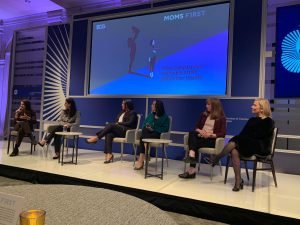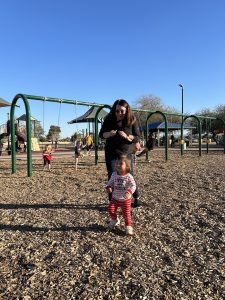This past week I was in Washington D.C. for a national gathering celebrating the release of a new report by Moms First and Boston Consulting Group. Sitting in the audience at the U.S. Chamber of Commerce building, right down the street from the White House, I couldn’t help feeling excited to learn more about some of the biggest findings the new report highlights, including that an employer return on investment in childcare for their employees can be as high as 425 percent!

Despite the positive returns, getting access to childcare in this country is a daunting task. And as I walked back to my hotel to enjoy a beautiful spring evening afterwards, I thought back to my own journey of finding childcare. After the initial elation my husband and I felt after we learned we would soon be parents, I had a growing worry knot in my stomach (was that worry or morning sickness?) as I thought about who we would find to be our child’s caregiver while both of us were at work. On this beautiful spring night, I shook my head to think that the stress I felt then is still a central issue at the core of the evening’s event, because the memory I have is from 35 years ago.
The team I am a part of at the AmFam Institute focuses on the social impact pillars of equity in education and healthy youth development. For the past five years, we’ve assessed the landscape for early childhood development, education and care and created partnerships both in local communities and nationally to move levers of change to close equity gaps for our very youngest children and their parents and caregivers. This message keeps coming through loud and clear from parents, caregivers, community organizations, and employers: our systems for care in the early family years are in desperate need of attention.

The presentation I attended marked the release of a landmark study on the impact of investment in childcare benefits by five U.S. employers. Indeed, as I absorbed the wealth of knowledge and information presented by Moms First and Boston Consulting Group (BCG) that night, and all their points aligned with what we observe in our own research, our partnerships, and our own lives: workplace changes in childcare benefits have a positive return on investment for working parents; yet public and private systems still fail families. Here are a few highlights from their research:
–Nearly 70% of working parents’ workdays have been impacted by childcare issues.
–58% of parents who left their job cited an inability to find childcare as a reason.
–63% of parents say they made career changes to afford childcare.
–66% of working parents are experiencing parental burnout.
What is the bottom line of these data points? Inadequate childcare systems cost companies profit and parents peace of mind. The research is compelling, and I encourage you to check out the full report, and for a deeper dive, please check out the BCG long-form article.
This study is not the first to come out recently, as the post-COVID childcare crisis has been heating up. Another initiative developed by a collaborative of organizations and businesses, led by our partners at NationSwell, created a website to paint a picture of the many factors that are coming together to create this current perfect storm in childcare. The website walks you through the issues facing different family scenarios to present a practical case for childcare investment, one that will provide a more inclusive and sustainable future for us all.

If you are still hungry for more information, a simple keyword search for “childcare crisis” will keep you knee deep in reading for the next week. I hope that what I am sharing has you intrigued- and possibly a little enraged- to the point that you will be itching to learn more!
The topic of early childhood education and care is just one of the complex challenges families face in their early years. Over the course of the next couple of weeks you will be seeing a selection of posts celebrating three special weeks- Community Doula Week, March 29-April 5, which will highlight our partners of and with community-based doulas, who play such a significant role in closing equity gaps for birthing families. Next up is Week of the Young Child, April 6-12, when we will highlight the organizations in our community investment portfolio whose mission is to address many of these challenges in early childhood education and care. Finally, we’ll join in Black Maternal Health Week, April 11-17, a time to elevate and learn from Black mothers and birth givers whose lives and children are on the front lines of a maternal and infant health crisis in the U.S. In upcoming posts, you will read about topics ranging from birth justice; to training future early childhood education, childcare, and community birth workforces; to researching how to better serve early childhood staff of color in Wisconsin. Please join us on social media to learn more.
Our education and youth development teams believe that investing in the early care economy and birth justice fortifies family success, leading to better outcomes across systems. When parents and caregivers have their needs covered, the economic and relational health and wellbeing of families and young children are also bolstered. Babies and young children are essential members of communities, so investing in families and communities also means investing in them.
As I have learned, just because my children are grown, it does not mean the issue of stable childcare in this country is solved. It is still an issue for the nurse who takes care of me at my doctor’s appointment, and the waiter at my favorite coffee shop and the person who delivers my mail every day. This is a topic that affects us all and requires innovative solutions that will result in system change. I am heartened to read reports like the one from Moms First and Boston Consulting Group, and to be able to share the website launched in conjunction with our partners at NationSwell.
Our whole team is encouraged and inspired by the amazing work we see in communities across this country, as evidenced by these reports, websites, and on-the-ground activations. Please join us on the Institute social media sites (Instagram, LinkedIn, Facebook, and X) to learn more and consider what role you play in nurturing the next generation.

